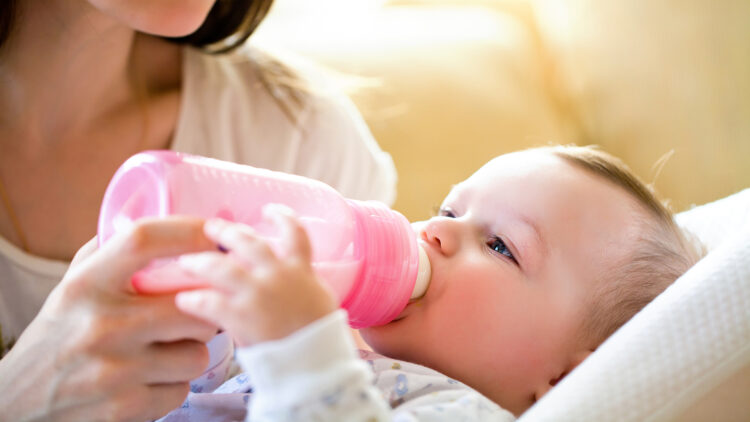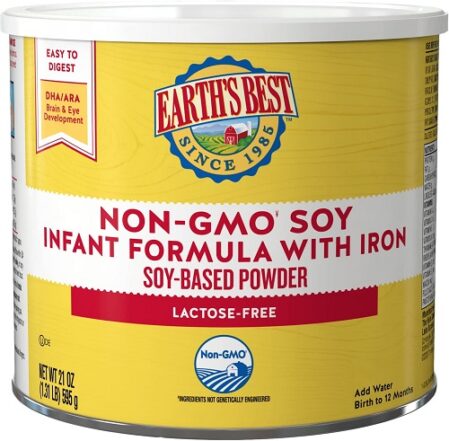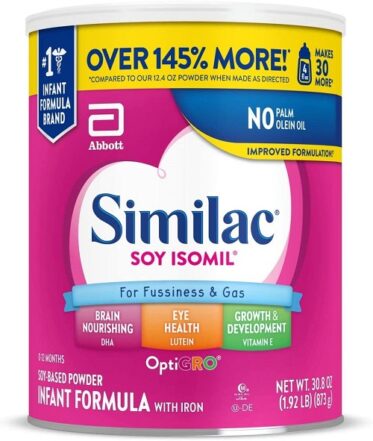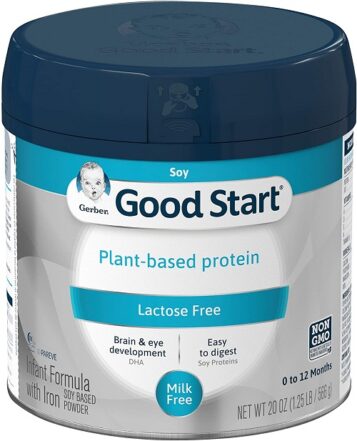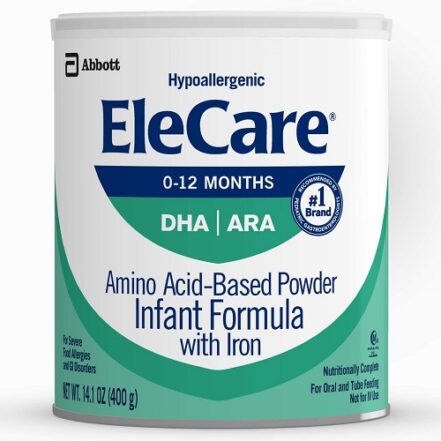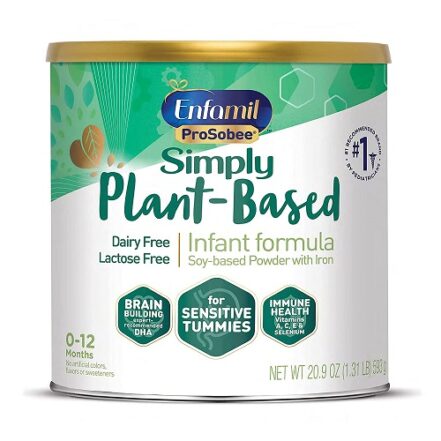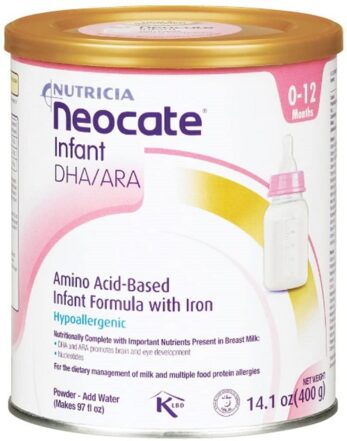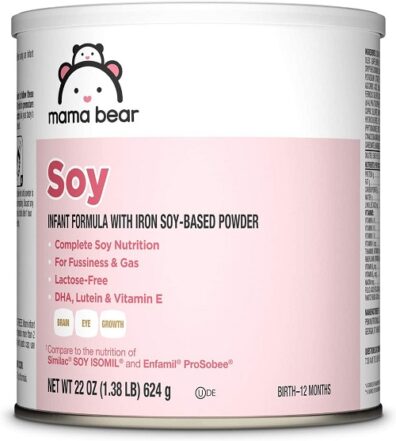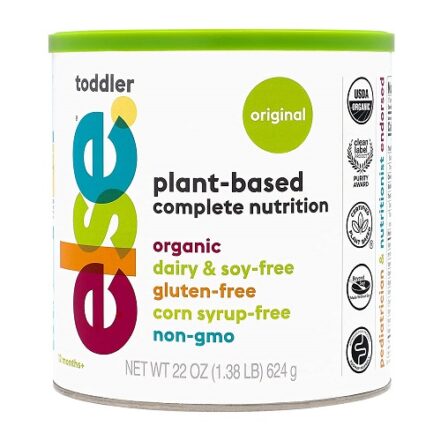Most baby formulas are milk-based or made from cow’s milk, but there are times that a mother will be advised to look for a non-dairy alternative when the baby is diagnosed with an allergy, sensitivity, or having a noticeable change of behavior after feeding. It is also an option for families who choose to introduce a vegan diet at an early age.
However, choosing the best dairy-free formula can be confusing, as the contents and terms aren’t always straightforward. It is important to know that lactose-free baby formula, sometimes called a hypoallergenic formula, is different from a dairy-free formula; some confuse the two. The lactose-free formula is still made of dairy, but it is treated and the lactose is reduced or removed altogether.
Note that not all “organic” formula is dairy-free. Some formulas claim to be organic but still have dairy or cow’s milk in them. That’s why it is essential to check the label first.
Always remember that a dairy-free formula contains zero amount of dairy. It is not made of milk from cows, so it is not “milk-based” or “milk formula”. This type of formula is made of nuts like soy, and grains; in other words, it is plant-based and can provide the same nutrients as breast milk.
Top 4 Best Dairy-free Formulas – Comparison
Best Dairy-free Formulas
Earth’s Best NON-GMO Plant-Based Formula with Iron
Soy-Based and Lactose-Free
This plant-based formula is made of high-quality non-GMO soy, meaning that the soybeans are grown without toxins and harmful chemicals like pesticides and artificial fertilizers. It has high-quality protein, carbohydrates, vitamins, minerals, and essential fatty acids like Omega-3 DHA and Omega-6 ARA that are naturally found in breast milk. It’s a complete pack of nutrition for your baby’s development in the first 12 months. It is also lactose-free, making it easy to digest for the baby’s little tummy. The formula contains choline and is fortified with iron to help the growth of red blood cells.
Earth’s Best has been dedicated to producing clean and organic baby products for over 30 years. This formula is Kosher-certified, and it does not contain any genetically modified ingredients (non-GMO), no preservatives, and artificial coloring. The claim approval is ensured with certificate number C003742-NOPHTR-10.
Key Features:
- Dairy-Free
- Contains DHA/ARA
- Iron-fortified
- Contains Lutein for eye development
- Prebiotics for an extra immunity
- Lactose-free
Similac Soy Isomil Infant Formula with Iron
For Fussiness and Gas
The Similac Soy Isomil is the most trusted brand by moms and pediatricians according to a survey by Nielsen. It has been clinically tested to work well with lactose intolerant babies and galactosemia.
Complete with essential nutrients, this baby formula soothes the baby’s sensitive tummy and is proven to be as gentle as breastmilk. The formula features OptiGRO in essentially blended Vitamine E, Lutein and DHA, so you can provide your baby with all the nutrients found naturally in breast milk. This combination of vitamins and minerals supports not only brain development but healthy eye function as well.
Key Features:
- OptiGRo that contains Vitamine E, Lutein, and DHA
- Nucleotides and prebiotics for added strong immunity
- Palmolein Oil-free, no Palm Oil added
Gerber Good Start Plant-Based Protein Formula
Lactose-free and Non-GMO Infant Formula
The Gerber Good Start Soy is perfectly made for infants requiring dairy-free formula. This lactose-free baby formula is designed to meet the gentleness of breast milk. The formula contains calcium and Vitamin D for strong bones and DHA for brain and eye development.
The plan-based proteins can support easy digestion, so if your child has a sensitive stomach and lactose intolerance, this will surely ease your baby’s fussiness and gas!
Key Features:
- Lactose-Free
- Easy to digest protein
- DHA for brain development
- Non-Gmo
- Corn syrup-free
Enfamil ProSobee Simply Plant Based Infant Formula
The formula for Milk Sensitivity
This dairy-free and lactose-free formula comes in powder, ready-to-use liquid, and concentrate liquid. It is also made of premium quality soybeans to minimize gas and colic caused by allergies to dairy.
The Enfamil ProSobee soy-based infant formula promotes cognitive development with an equal amount of DHA from the Enfamil routines formula. It has been specifically made for babies diagnosed with lactose intolerance and is suitable for vegetarians and Kosher families.
This ProSobee soy-based formula is made to be gentle on your baby’s little tummy. It works well with colicky and gassy babies. In addition to that, it has a complete combination of important vitamins and minerals plus Omega-3 DHA.
Key Features:
- DHA Brain support
- Immunity support
- Eases gas and colic
- Lactose sensitive
- Dairy-free
EleCare Hypoallergenic Amino Acid Based Formula
For severe food allergies
Trusted by professionals to help improve symptoms of severe milk allergy, this formula is made of pure amino acids that are perfect for babies who have allergies or an intolerance to hydrolyzed protein. It supports physical growth and development, but it does require a doctor’s supervision if being fed to a premature baby.
This is truly a lifesaver for parents who have fussy or colicky babies, as it is clinically proven to help with gastrointestinal conditions. Some moms say that this non-dairy formula smells better than other brands.
Key Features:
- DHA and ARA for brain development
- 100% Amino Acid-based
- Hypoallergenic
Neocate Infant with DHA and ARA
Amino-Based Powder Formula with Iron
This baby formula is hypoallergenic, specially designed for infants with Multiple Food Allergies (MFA). This formula is both dairy-free and soy-free.
It features powerful combinations of DHA and ARA, iron, and many more vitamins and minerals that are naturally found in breast milk. This helps to support your baby’s mental and eye development while being gentle to their digestive system. It is the only hypoallergenic formula that contains nucleotides.
Neocate infant formula for your baby is Kosher and Halal Certified and does not contain any genetically modified ingredients. It is the first to be an elemental formula containing individual amino acids instead of whole protein, making it easier for the body to absorb.
Key Features:
- Contains DHA and ARA for brain development
- Amino acid-based
- Iron-fortified
- Contains Nucleotides
- Soy oil-free
- Non-GMO
Mama Bear Soy-Based Powder with Iron
For fussiness and Gas, Lactose-free and Gluten-free baby formula
This infant soy formula is designed for babies with lactose-sensitive digestive systems, providing total comfort against gas and fussiness. It has complete essential nutrients for your babies and suits newborns up to 12 months. Containing 100% soy protein and over 25 vitamins, minerals, and essential ARA fatty acids, your baby’s development will surely benefit.
Unlike other soy-based formulas, this formula has prebiotics to give your baby healthy, digestion-promoting bacteria. It is gluten-free, Kosher certified, and proudly owned and distributed by Amazon. To ensure the quality of this organic formula, they have partnered with a leading infant formula manufacturer.
Key Features:
- Lactose-free
- No artificial growth hormones
- Non-GMO
- Gluten-free
- Contains DHA for mental development
- Iron-fortified
- With prebiotics for added immunity
Else Plant-Based Complete Nutrition Formula for Toddlers
This brand is dedicated to producing clean plant-based formulas for babies. It contains a complete pack of more than 20 vitamins and minerals and is a perfect alternative for babies who avoid dairy and soy.
Else’s goal is to manufacture a clean formula that is chemical-free and does not contain any genetically engineered contents. Many mothers notice that it lacks the usual chemical formula smell.
This toddler formula is uniquely made with almond nuts, buckwheat, and tapioca–a very powerful combination of all the vitamins and minerals needed for a growing child.
Key Features:
- Dairy-free
- Soy-free
- Gluten-free
- No corn syrup added
- Non-Gmo
Non-dairy vs. Non-cow’s milk
The terms ‘non-dairy baby formula’ and ‘non-cow’s milk formula’ are frequently confused, so it is important to know the difference when looking at alternative infant formulas.
‘Non-cow’s milk’ is actually another term for goat’s milk, which still contains dairy. Though goat’s milk is not dairy-free, many mothers and professionals tend to choose goat milk for its lighter milk protein that is easy to digest and less likely to give an allergic reaction. However, studies show that the majority of babies who develop an allergic reaction to cow’s milk will most likely develop an allergy to goat’s milk as well.
‘Non-dairy baby formula’, on the other hand, is not a milk-based formula, instead using plant-based sources of nutrition to your baby in formula-form.
Reasons to opt for a dairy-free or lactose-free formula

Many babies struggle to tolerate the milk-based formulas, hence why many mothers look for an alternative. Protein from cow’s milk can trigger a baby’s immune system and cause an allergy. It can also cause sensitivity due to poor digestive response, and both of these are life-threatening. Here are a few symptoms you should watch out for when feeding your formula-fed baby.
CMPI (Cow’s Milk Protein Intolerance)
Allergy to cow’s milk protein is not the same as lactose intolerance. It triggers the immune system. Even breastfed babies can have an allergic reaction if their mother ingests protein from cow’s milk or a food that contains dairy before feeding.
Lactose intolerance
This refers to the inability to break down or digest lactose, the sugar found in milk. A baby with lactose intolerance can still tolerate dairy as if the lactose is removed or reduced, unlike a baby with CMPI. This explains why not all low-lactose formulas or lactose-free formulas are completely dairy-free; you can remove lactose without discarding the dairy altogether.
Colic
When a healthy baby cries for more than three hours a day in a month without a clear reason, this may be a sign of colic.
It can happen in breastfed babies and formula-fed babies. While the cause isn’t fully understood, some attribute this excessive crying to bowel immaturity.

Gas
This happens when a baby ingests air which can result in discomfort and fussiness. This can happen due to excessive crying or from bottle feeding (whether formula feeding or bottle feeding with breastmilk).
Acid reflux
If your child is having a large number of spit-ups in every feed, they may be experiencing reflux which causes an uncomfortable and painful burning sensation.
Constipation and Diarrhea
Both of these well-known bowel issues can cause extreme discomfort in your child. Not pooping for more than 3 days or more frequent pooping than usual can lead to dehydration.
Final thoughts
Breast milk is the most suitable food for babies up to 2 years of age and beyond. Some mothers are unable to breastfeed their babies as much as they would like to, however, and may choose formula-based feeding instead. Whether you make the change due to health reasons or by personal choice, it is important to ask your trusted pediatrician’s opinion before walking into the formula milk aisle.
Remember that soy formulas are not always the best choice for babies diagnosed with cow’s milk intolerance. Research shows that 60% of babies with CMPI can also have allergic reactions to soy milk protein. Still, with research and due diligence, you will be able to find the perfect formula that suits your child’s digestive system and makes for an enjoyable feeding experience.

